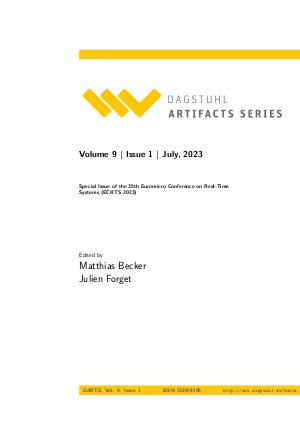DARTS, Volume 9, Issue 1
Special Issue of the 35th Euromicro Conference on Real-Time Systems (ECRTS 2023)
-
Part of:
Volume:
DARTS, Volume 9 (ECOOP 2023)
Conference: Euromicro Conference on Real-Time Systems (ECRTS)
Journal: Dagstuhl Artifacts Series (DARTS)

Editors
Publication Details
- published at: 2023-07-03
- Publisher: Schloss Dagstuhl – Leibniz-Zentrum für Informatik
- DBLP: db/journals/darts/darts9
Access Numbers
- Detailed Access Statistics available here
-
Total Document Accesses (updated on a weekly basis):
0PDF Downloads
Documents
Front Matter, Table of Contents, Preface, Conference Organization
Abstract
Cite as
Special Issue of the 35th Euromicro Conference on Real-Time Systems (ECRTS 2023). Dagstuhl Artifacts Series (DARTS), Volume 9, Issue 1, pp. 0:i-0:x, Schloss Dagstuhl – Leibniz-Zentrum für Informatik (2023)
Copy BibTex To Clipboard
@Article{becker_et_al:DARTS.9.1.0,
author = {Becker, Matthias and Forget, Julien},
title = {{Front Matter, Table of Contents, Preface, Conference Organization}},
pages = {0:i--0:x},
journal = {Dagstuhl Artifacts Series},
ISSN = {2509-8195},
year = {2023},
volume = {9},
number = {1},
editor = {Becker, Matthias and Forget, Julien},
publisher = {Schloss Dagstuhl -- Leibniz-Zentrum f{\"u}r Informatik},
address = {Dagstuhl, Germany},
URL = {https://drops.dagstuhl.de/entities/document/10.4230/DARTS.9.1.0},
URN = {urn:nbn:de:0030-drops-180211},
doi = {10.4230/DARTS.9.1.0},
annote = {Keywords: Front Matter, Table of Contents, Preface, Conference Organization}
}
A New Perspective on Criticality: Efficient State Abstraction and Run-Time Monitoring of Mixed-Criticality Real-Time Control Systems (Artifact)
Abstract
Cite as
Tim Rheinfels, Maximilian Gaukler, and Peter Ulbrich. A New Perspective on Criticality: Efficient State Abstraction and Run-Time Monitoring of Mixed-Criticality Real-Time Control Systems (Artifact). In Special Issue of the 35th Euromicro Conference on Real-Time Systems (ECRTS 2023). Dagstuhl Artifacts Series (DARTS), Volume 9, Issue 1, pp. 1:1-1:3, Schloss Dagstuhl – Leibniz-Zentrum für Informatik (2023)
Copy BibTex To Clipboard
@Article{rheinfels_et_al:DARTS.9.1.1,
author = {Rheinfels, Tim and Gaukler, Maximilian and Ulbrich, Peter},
title = {{A New Perspective on Criticality: Efficient State Abstraction and Run-Time Monitoring of Mixed-Criticality Real-Time Control Systems (Artifact)}},
pages = {1:1--1:3},
journal = {Dagstuhl Artifacts Series},
ISSN = {2509-8195},
year = {2023},
volume = {9},
number = {1},
editor = {Rheinfels, Tim and Gaukler, Maximilian and Ulbrich, Peter},
publisher = {Schloss Dagstuhl -- Leibniz-Zentrum f{\"u}r Informatik},
address = {Dagstuhl, Germany},
URL = {https://drops.dagstuhl.de/entities/document/10.4230/DARTS.9.1.1},
URN = {urn:nbn:de:0030-drops-180229},
doi = {10.4230/DARTS.9.1.1},
annote = {Keywords: Real-time Control, Mixed-Criticality, Switched Systems, State Monitoring}
}
FusionClock: WCEC-Optimal Clock-Tree Reconfigurations (Artifact)
Abstract
Cite as
Eva Dengler, Phillip Raffeck, Simon Schuster, and Peter Wägemann. FusionClock: WCEC-Optimal Clock-Tree Reconfigurations (Artifact). In Special Issue of the 35th Euromicro Conference on Real-Time Systems (ECRTS 2023). Dagstuhl Artifacts Series (DARTS), Volume 9, Issue 1, pp. 2:1-2:3, Schloss Dagstuhl – Leibniz-Zentrum für Informatik (2023)
Copy BibTex To Clipboard
@Article{dengler_et_al:DARTS.9.1.2,
author = {Dengler, Eva and Raffeck, Phillip and Schuster, Simon and W\"{a}gemann, Peter},
title = {{FusionClock: WCEC-Optimal Clock-Tree Reconfigurations (Artifact)}},
pages = {2:1--2:3},
journal = {Dagstuhl Artifacts Series},
ISSN = {2509-8195},
year = {2023},
volume = {9},
number = {1},
editor = {Dengler, Eva and Raffeck, Phillip and Schuster, Simon and W\"{a}gemann, Peter},
publisher = {Schloss Dagstuhl -- Leibniz-Zentrum f{\"u}r Informatik},
address = {Dagstuhl, Germany},
URL = {https://drops.dagstuhl.de/entities/document/10.4230/DARTS.9.1.2},
URN = {urn:nbn:de:0030-drops-180238},
doi = {10.4230/DARTS.9.1.2},
annote = {Keywords: energy-constrained real-time systems, worst-case execution time (WCET), worst-case energy consumption (WCEC), energy-aware real-time scheduling, static whole-system analysis, time/energy tradeoff, clock tree, system on chip}
}
Isospeed: Improving (min,+) Convolution by Exploiting (min,+)/(max,+) Isomorphism (Artifact)
Abstract
Cite as
Raffaele Zippo, Paul Nikolaus, and Giovanni Stea. Isospeed: Improving (min,+) Convolution by Exploiting (min,+)/(max,+) Isomorphism (Artifact). In Special Issue of the 35th Euromicro Conference on Real-Time Systems (ECRTS 2023). Dagstuhl Artifacts Series (DARTS), Volume 9, Issue 1, pp. 3:1-3:4, Schloss Dagstuhl – Leibniz-Zentrum für Informatik (2023)
Copy BibTex To Clipboard
@Article{zippo_et_al:DARTS.9.1.3,
author = {Zippo, Raffaele and Nikolaus, Paul and Stea, Giovanni},
title = {{Isospeed: Improving (min,+) Convolution by Exploiting (min,+)/(max,+) Isomorphism (Artifact)}},
pages = {3:1--3:4},
journal = {Dagstuhl Artifacts Series},
ISSN = {2509-8195},
year = {2023},
volume = {9},
number = {1},
editor = {Zippo, Raffaele and Nikolaus, Paul and Stea, Giovanni},
publisher = {Schloss Dagstuhl -- Leibniz-Zentrum f{\"u}r Informatik},
address = {Dagstuhl, Germany},
URL = {https://drops.dagstuhl.de/entities/document/10.4230/DARTS.9.1.3},
URN = {urn:nbn:de:0030-drops-180247},
doi = {10.4230/DARTS.9.1.3},
annote = {Keywords: Deterministic Network Calculus, min-plus algebra, max-plus algebra, performance, algorithms}
}
From FMTV to WATERS: Lessons Learned from the First Verification Challenge at ECRTS (Artifact)
Abstract
Cite as
Sebastian Altmeyer, Étienne André, Silvano Dal Zilio, Loïc Fejoz, Michael González Harbour, Susanne Graf, J. Javier Gutiérrez, Rafik Henia, Didier Le Botlan, Giuseppe Lipari, Julio Medina, Nicolas Navet, Sophie Quinton, Juan M. Rivas, and Youcheng Sun. From FMTV to WATERS: Lessons Learned from the First Verification Challenge at ECRTS (Artifact). In Special Issue of the 35th Euromicro Conference on Real-Time Systems (ECRTS 2023). Dagstuhl Artifacts Series (DARTS), Volume 9, Issue 1, pp. 4:1-4:6, Schloss Dagstuhl – Leibniz-Zentrum für Informatik (2023)
Copy BibTex To Clipboard
@Article{altmeyer_et_al:DARTS.9.1.4,
author = {Altmeyer, Sebastian and Andr\'{e}, \'{E}tienne and Dal Zilio, Silvano and Fejoz, Lo\"{i}c and Harbour, Michael Gonz\'{a}lez and Graf, Susanne and Guti\'{e}rrez, J. Javier and Henia, Rafik and Le Botlan, Didier and Lipari, Giuseppe and Medina, Julio and Navet, Nicolas and Quinton, Sophie and Rivas, Juan M. and Sun, Youcheng},
title = {{From FMTV to WATERS: Lessons Learned from the First Verification Challenge at ECRTS (Artifact)}},
pages = {4:1--4:6},
journal = {Dagstuhl Artifacts Series},
ISSN = {2509-8195},
year = {2023},
volume = {9},
number = {1},
editor = {Altmeyer, Sebastian and Andr\'{e}, \'{E}tienne and Dal Zilio, Silvano and Fejoz, Lo\"{i}c and Harbour, Michael Gonz\'{a}lez and Graf, Susanne and Guti\'{e}rrez, J. Javier and Henia, Rafik and Le Botlan, Didier and Lipari, Giuseppe and Medina, Julio and Navet, Nicolas and Quinton, Sophie and Rivas, Juan M. and Sun, Youcheng},
publisher = {Schloss Dagstuhl -- Leibniz-Zentrum f{\"u}r Informatik},
address = {Dagstuhl, Germany},
URL = {https://drops.dagstuhl.de/entities/document/10.4230/DARTS.9.1.4},
URN = {urn:nbn:de:0030-drops-180257},
doi = {10.4230/DARTS.9.1.4},
annote = {Keywords: Verification challenge, industrial use case, end-to-end latency, real-time systems, response time analysis}
}
